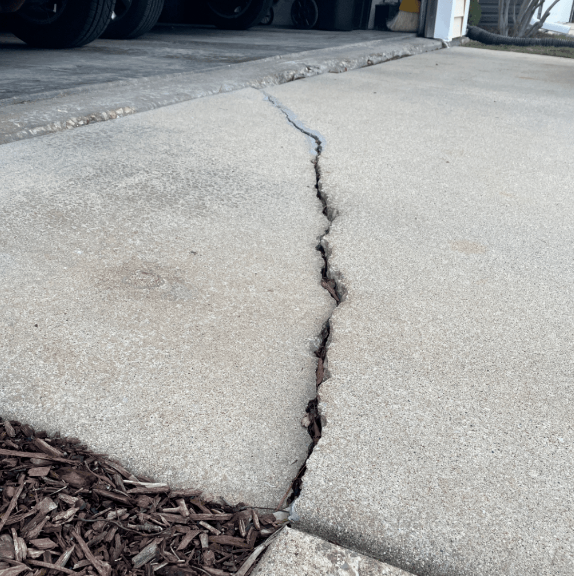Cracks in a concrete driveway can be caused by various factors, and it’s often a combination of several elements. Here are some common reasons why concrete driveways develop cracks:
- Settling and Shifting:
- Over time, the ground underneath the concrete may settle or shift, leading to stress on the concrete slab and causing cracks.
- Freeze-Thaw Cycles:
- In regions with cold climates, the freeze-thaw cycle can be a significant factor. Water seeps into the concrete, and when it freezes, it expands, exerting pressure on the concrete and causing cracks.
- Subgrade Issues:
- Poorly compacted or unstable soil beneath the concrete can result in settling and cracking. It’s essential to have a solid and well-prepared base before pouring the concrete.
- Excessive Weight and Loads:
- Heavy vehicles or equipment, especially if they are concentrated in specific areas, can lead to the development of cracks over time.
- Improper Installation:
- If the concrete mix is not properly proportioned or if the installation process is flawed, it can result in a weakened structure prone to cracking.
- Drying Shrinkage:
- Concrete undergoes a natural curing process during which it shrinks. If the mix lacks sufficient water or if the concrete dries too quickly, it may lead to cracking.
- Chemical Exposure:
- Exposure to certain chemicals, such as de-icing salts or harsh cleaning agents, can accelerate the deterioration of concrete and contribute to cracking.
- Lack of Expansion Joints:
- Without proper expansion joints, concrete slabs may not have the flexibility to expand and contract with temperature changes, leading to cracks.
- Tree Roots:
- Tree roots can grow beneath the concrete, causing it to lift and crack. It’s essential to consider the proximity of trees to the driveway.
- Abrupt Temperature Changes:
- Rapid temperature changes, especially in hot climates, can lead to thermal expansion and contraction, resulting in cracks.
To address and prevent future cracking, it’s crucial to identify the specific cause or combination of causes in your situation. Regular maintenance, proper installation, and addressing underlying issues can help minimize the risk of cracks in concrete driveways. If you’re unsure about the cause or how to address the cracks, it may be advisable to consult with a professional concrete contractor or engineer.

